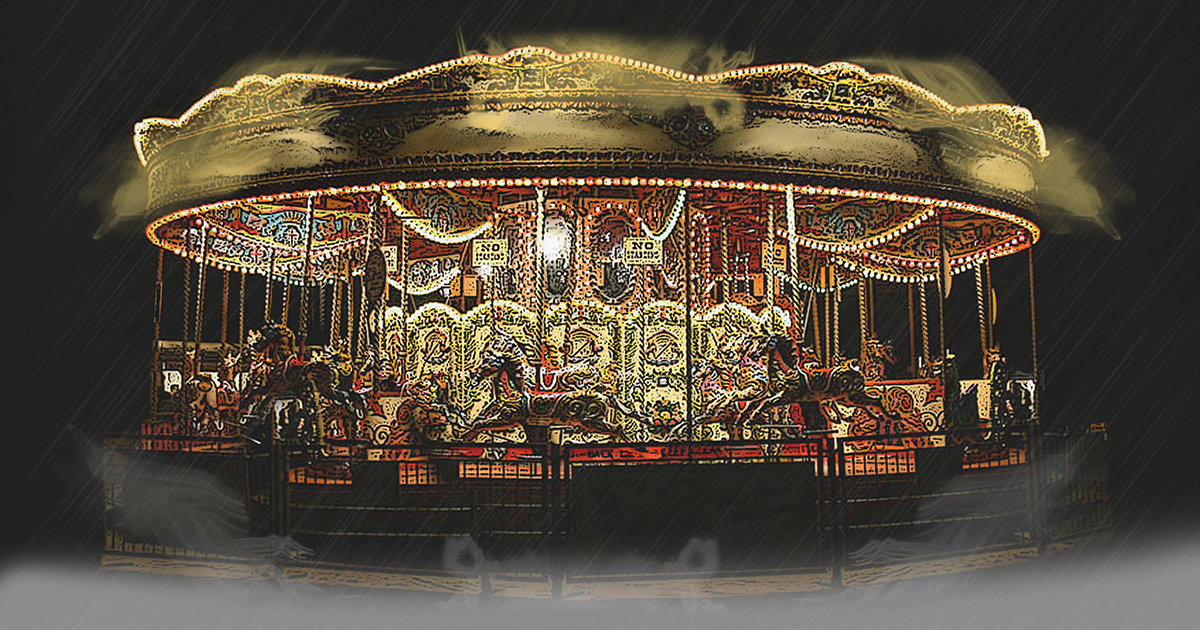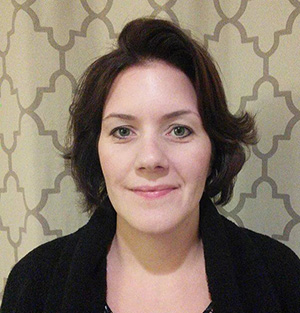ANNIE
★ ★ ★ ★
FICTION

Image by Ashling McKeever
By Courtney Harler
Big-eyed and big-busted, with long black lashes and my long black hair piled into a bun. I stood elegant, tall, at least five-ten. Weighed maybe one-twenty. “Slender and lively,” they had all said. Or, “Lithe and mysterious.” Either way, “She’s something,” they boasted. From thirteen, I studied the men on the street, their ways. My father died early: a grieving knock-kneed toddler, chubby in a yellow dress standing over a heating grate on a New York City sidewalk, my mother the ghostly photographer reflected in the shop’s window above my head. The smudged caption on the back of the photo read AARON’S FUNERAL in slanted block letters.
When I was eleven years old, I went to Coney Island, snuck my first smoke on the gaudy carousel. I remained hooked by the secret rush until fifty.
Today I am much older, shorter, and wider, and I am sick. My lungs filled with pitch, my stomach with acid. I find it difficult to speak to my children. No one looks at me anymore, except with pity. If they knew me better, they’d know better than to offer me hollow sympathy. One night I stop breathing only to come awake with a tube in my neck. I yank it out and blood freckles the white sheets pulled up over my chest. I can’t breathe and the nurses come running. They tell me that the tracheotomy will help me breathe, that I mustn’t try to speak, ever again. I feign too proud to mime, too proud to sign; they buy me a chalkboard with chalk on a string.
When I was young and wild, I rode on the backs of motorcycles with burly men. Once, dismounting, I seared my calf on a smoking tailpipe that left a blistered oval. I still have the brown scar just above my sock line. My mother had warned me, knowing I wouldn’t listen. Too full, too unctuous, but not in a pious way. I became the sacred oil, waiting to burn.
Now I travel in a wheelchair, an oxygen tank on its rack. I watch stupid sitcoms on a tiny TV in my bedroom. I eat slop off a tray. My nurse helps me to bed. “Try to rest tonight, Annie,” she says. I just grunt. The moon is an egg in my window, slightly cracked and leaking albumin.
I went west to find a man, a job, and a new-age church, but I found the red rocks of the desert instead. The sign said the rocks were once sand dunes, now hardened into mountains of sleek ochre layers, stairs for hikers with hungry eyes. I found lichen in the cracks of the steps, in the pastel greens and blues of water, and the colors reminded me of spring in New York City. My mother asked us all home for holidays, for antipasto and turkey in her cluttered apartment. She didn’t mind who I brought, but I told her I found it expensive to travel on my small salary. I sent her a card for Christmas and telephoned her on her birthday in early March, most years.
My children bring me a pink hyacinth for Easter. It stinks up my room and I give the flower, still growing from a loose bulb in its pot, to the nurse at the front desk. She smiles but knows I am re-gifting a present from my children. She asks how they are—my children, my grandchildren—and I mouth, “They’re fine. They’re all fine.” Two years since I lost my voice to the tube, since I stopped talking. How would I know how they are now, what they do now?
My children had multiple fathers out west. Never married any of them. Never found the right time. When my men moved on, I simply let them go. No money, no worries, no visits, no problems. I held us together, a standing lenticular cloud in the desert sky, stubborn and inscrutable, an opaque lens of wet smoky mist. A pyramid of cloud like a metal spinning top, refusing to mold to the sensual wishes of the mountain winds. Be damned the hot monsoon.
“It’s time,” I want to tell them. “Let me go,” I try to say. I hear them and see them, dimly, still loving me, still needing me, but they can’t come with me, not yet. Probably not ever.
The city taught me how to burn; the desert dried my sweat to salt. I can no longer cool my fever. Please, let me combust into ash this day. Let me float away, finally free, to be nothing.

Courtney Harler is currently pursuing an MFA in Creative Writing from Sierra Nevada College. She also holds an MA in English Literature from Eastern Washington University. She attended Bread Loaf 2016. Her work has appeared in Northwest Boulevard, Neon Dreams, The Vignette Review, Blue Monday Review, Chicago Literati, and From the Depths. Her work is forthcoming in Palaver, Sierra Nevada Review, The Normal School, and Far Off Places. Courtney’s flash story, “Wild Turkeys,” has been nominated for a 2017 Pushcart Prize. She lives in Las Vegas.

DEAR READER
At The Wild Word we are proud to present some of the best online writing around, as well as being a platform for new and emerging writers and artists.
As a non-profit, the entire site is a labour of love.
If you have read the work in The Wild Word and like what we do, please put something in our tip jar to keep this amazing platform alive.
THANK YOU FOR YOUR SUPPORT!























